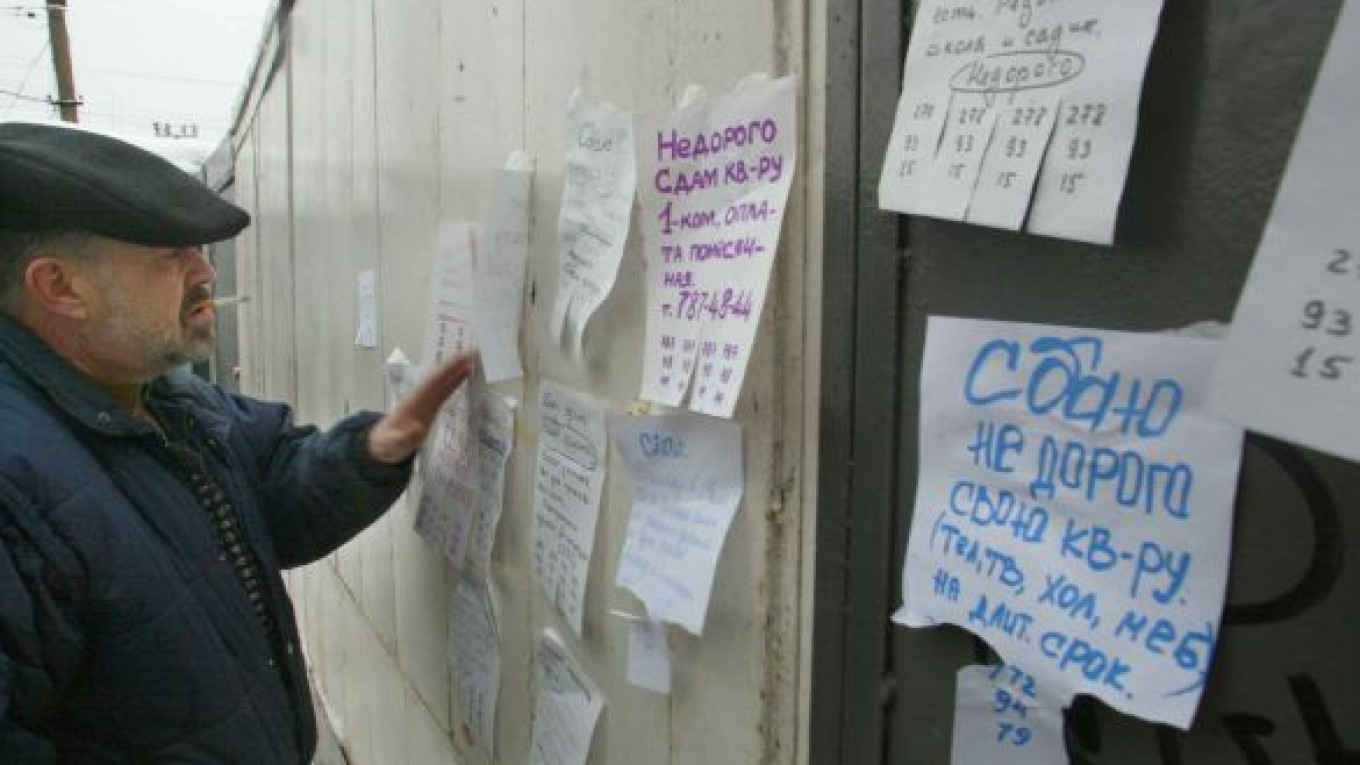Moscow authorities expect massive incremental income tax collection from apartment landlords to start next year — a measure that might bring an additional 5 billion rubles ($154 million) into the city budget, although some experts warn the effort might backfire.
City Hall plans to complete gathering information about those renting out their property by the end of this year, with tax declarations to be submitted between Jan. 1 and April 30, head of the Moscow department of economic policy and development Maxim Reshetnikov told a news conference late last week.
"We are actually working for the next year's revenue," he said, adding that the Federal Tax Service should create an easy payment procedure.
The city authorities are counting on cooperation between local police stations and property management companies and homeowner associations to identify potential taxpayers. The final lists will be put together by the police and then sent to the Federal Tax Service.
The neighbors of those renting out their properties are also expected to provide information, Reshetnikov said, adding that legalization of the rental market is a matter of residential safety.
Property owners shouldn't have to deal with any more red tape, Reshetnikov said, because it's not the tax rate — which will be 13 percent of the rental income — but bureaucracy and excessive paperwork that keep landlords in the shadows.
"The tax of 13 percent is not such a high burden to make one unwilling to pay," he said, adding that the tax is unlikely to become an additional burden for tenants, as landlords are not expected to rush hiking prices because of the market competition.
But the additional cost might be rather painful for some owners of economy-class apartments for whom the rental payments are the only income.
"If we subtract 13 percent from the rate of 25,000 rubles, a person will lose a significant sum," said Natalya Sivko, managing director at MIEL-Arenda. As a result of City Hall's initiative, rates in the economy class might go up, she said in e-mailed comments.
An average monthly rate for a one-room economy-class apartment in the center of Moscow —one of the most expensive city districts — reached 36,757 rubles last month, and it cost 42,678 rubles to rent a two-room apartment, according to estimates by the real estate agency.
However, Galina Senko, director of the leasing department at IntermarkSavills, said the economy-class segment is unlikely to feel the changes, because identifying homeowners who rent out their apartments might be challenging.
"The fact of commercial rental is impossible to prove," she said by telephone, adding that it is a problem of the grey economy in general, which needs to be addressed.
In one example, a tenant who gets a grey salary and declares a lower income, which might not be sufficient to cover the rental costs, signs an agreement on using the rented property without charge. In that case, the real relations between the tenant and the landlord are reduced to a handshake, Senko said.
Reshetnikov said that 90 percent to 95 percent of the rental market is currently in the shadows, with only 5,000 landlords actually paying taxes annually.
That handful of honest taxpayers is comprised of those renting out high-end properties, analysts said.
Almost 100 percent of the landlords who charge $4,000 or more per month for rent pay taxes, because in fact they have to pay a meager sum compared to what they earn, Senko said, adding that such homeowners usually get registered as self-employed entrepreneurs and pay a reduced tax of 6 percent.
City Hall expects that increased scrutiny over the taxes paid by those renting out their properties will add a total of 5 billion a year to the city budget. Reshetnikov said this sum is equivalent to the cost of building 25 kindergartens or funding 40,000 children in a kindergarten for a year.
But Oleg Repchenko, head of IRN.ru, said that the ends might not justify the means, since the budget costs of bringing the rental market out of the shadows might be much higher than the revenues.
The sum City Hall expects to collect is unlikely to cover the budget spending on salaries of local police officers, who will help identify the potential taxpayers, and the court fees if it comes to legal action to prove the fact of rental, he said.
A Message from The Moscow Times:
Dear readers,
We are facing unprecedented challenges. Russia's Prosecutor General's Office has designated The Moscow Times as an "undesirable" organization, criminalizing our work and putting our staff at risk of prosecution. This follows our earlier unjust labeling as a "foreign agent."
These actions are direct attempts to silence independent journalism in Russia. The authorities claim our work "discredits the decisions of the Russian leadership." We see things differently: we strive to provide accurate, unbiased reporting on Russia.
We, the journalists of The Moscow Times, refuse to be silenced. But to continue our work, we need your help.
Your support, no matter how small, makes a world of difference. If you can, please support us monthly starting from just $2. It's quick to set up, and every contribution makes a significant impact.
By supporting The Moscow Times, you're defending open, independent journalism in the face of repression. Thank you for standing with us.
Remind me later.






